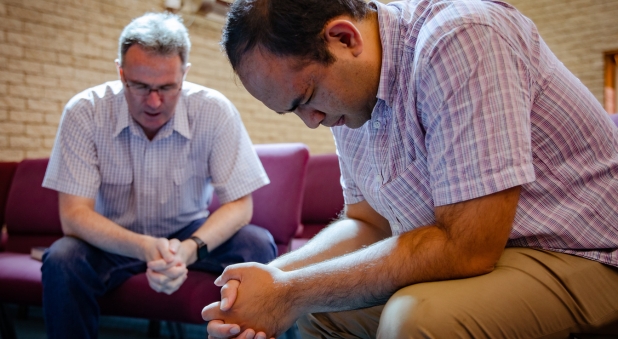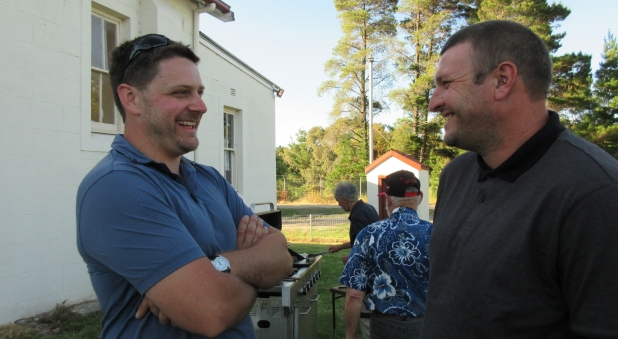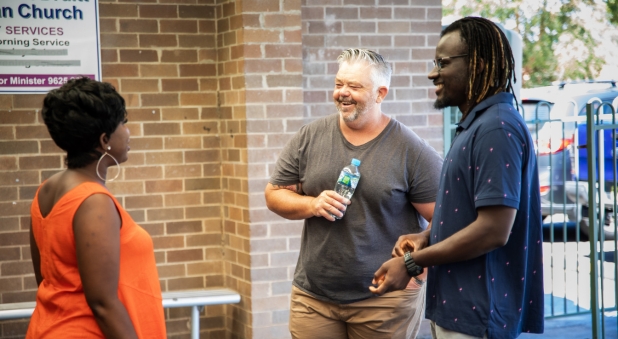The 10am congregation at Berkeley Life Centre comes out into the summer sun, ready to chat with a cuppa and a biscuit. Everybody says hello to the stranger – everybody – and one guy checks that I’m okay. Do I need to talk to the minister?
Michael, a fellow with a well-worn face and a shock of white hair, is particularly chatty, full of discussion about faith and why it’s good to just walk down the street and tell people. I find out a short while later that, after attending church regularly for some time, he gave his life to Jesus a few weeks earlier.
“He cut up his cards for going to the club, he’s getting off the alcohol and he’s going out and talking to people and that’s the most powerful witness we have,” says Berkeley’s fellowship leader the Rev Wayne Pickford. “He used to come to church, but how he puts it is that he’s a real Christian now – and that only happens because of God.”
Right there in the discussion with Pickford and Michael is Glenn Prentice, one of 10 laypeople from around the Diocese chosen to take part in The Well Training program – a new initiative to help train up leaders from parishes in marginalised areas to serve their local people.
“It’s not a job – I love helping people, I love being there for people,” Prentice says. “I’ve got two of the best bosses in the world – Wayne and God, so it’s great. And I just really appreciate the opportunity to learn.”
What is The Well Training?
Put simply, The Well is a two-year, apprentice-based program set up to train people from marginalised communities for those communities – understanding from the outset that the word “marginalised” refers to a range of factors, including economic, social and educational.
Obviously good church leaders are needed everywhere, but those who live in marginalised areas need people who “get” them and the local culture. They need leaders who can get alongside them as they are – and nobody can do that better than people who already live among them.

“I’ve lived in poor communities since I was 17 or 18 and I choose them,” says the program’s project director, Dr Coz Crosscombe. “I would choose Mt Druitt any day of the week... because life is easier, it’s nicer, it’s richer spiritually, and it’s much easier to see God at work in this community.
life is easier, it’s nicer, it’s richer spiritually, and it’s much easier to see God at work in this community.
“But people from poorer backgrounds have had less opportunity to show their talents. If we begin by saying, ‘I believe that you’re made in the image of the Creator’, that makes you the most amazing person I’m ever going to come across. And so, if God’s not bigoted or racist or prejudicial against poor people, which he’s obviously not, then he must have gifted poor people with amazing gifts. In fact, I’d say he’s prejudicial towards poorer people, and I’d say Scripture supports that!
“James 2 says God has ‘chosen those who are poor in the eyes of the world to be rich in faith’ [v5]. Spiritual vitality is among the poor.”
The chairman of the Ministry to Marginalised Areas Committee and Bishop of Wollongong, Peter Hayward, is filled with excitement that The Well program has come together.
“God has been very kind to bring about the people and circumstances to finally enable this process to happen,” he says. “The Diocese has longed for this sort of work for many years and we’re glad that it has come to fruition. A million dollars in funding has been received from a source to enable this to develop and begin, and we’re extremely grateful that they have encouraged and backed this work.”
How it works
Interns taking part in The Well are seeking to minister to marginalised people groups as well as areas, so those taking part are from Africa, the Subcontinent and the Philippines as well as Australia (including Indigenous Australia); the parishes involved are South Liverpool, Minchinbury, Lithgow, Sadleir, Nowra, Lalor Park and Doonside, in addition to Mt Druitt and Berkeley.
The Well follows a bivocational model as this is more sustainable in areas that may struggle to afford a full-time pastor. Some participants have secular jobs – such as carpenter James Barnes from Portland (Lithgow parish) and juvenile justice youth officer Eddie Bognet – while others already work in ministry roles, like community chaplain Beejai Abrahams and Indigenous pastor Brendon Garlett.
Each week interns have on-the-job training, seeking to learn or build upon what they know about ministry. There will also be time to connect with the community and build relationships.

The rector of Mt Druitt and coaching director for The Well, the Rev Craig Hooper, explains that every intern has a team around them: a site supervisor, coach, trainer and support person, who are all there to care for and guide them in various ways.
“They think of themselves as gardeners, helping the interns grow both as Christians and as gospel workers,” he says. “I was talking today with them about it, that – overall – their role is to ask the intern how they are going in their relationships, and how they are going in their role. In their relationship with the Lord, what is God showing them? What are they hearing from God? How is he challenging them? If they’re married, how are they going with their wife or husband, their kids, their co-workers? Then, how are they going in their role, in the work that they’re doing? Are there things that they’re struggling with? Are there any skills that need to be developed? What is the worth of trying certain things?
“Scripture talks about being all things to all people, so that by all possible means we might save some. So, we’ll be flexible in terms of training these guys, focused on them and what their skills are. So, for example, if their skill is in reading and writing, we’ll equip them that way. If their skill is in listening and speaking, equip them that way. We want to help these interns grow in Christ and also grow in being gospel workers in the way God has shaped them, so they bloom for God’s glory in their life and their ministry.
“We don’t want them to become ‘like us’… We’re saying God has wired you in a unique and special way, which we praise God for. We want to help you grow in bloom in that way, so it’s intern-focused rather than institution-focused.”
Adds Wayne Pickford: “I think it’s great. Certain people are right for certain areas. Not everybody can manage to go through Moore College, but they can do ministry in socially disadvantaged areas... This new system is a way of recruiting people who will be a good fit”.
The plan is that The Well will focus first on parishes in marginalised areas and, if this works well for both trainees and the community, to then turn to parishes that contain marginalised pockets and seek to train up locals for those areas, too.
As part of the program, everyone involved in The Well will undertake the Diploma of Biblical Theology from Moore College with extra academic support for those who need it. There will also be four additional subjects taught by Crosscombe that include such things as understanding communities and different models of ministry.
Moore College’s vice-principal, the Rev Dr Simon Gillham, says the college is “delighted” to be a partner in the initiative “to train up gospel workers from parts of Sydney where we have not historically done very well.
“The Diploma of Biblical Theology is pitched at a level and delivered in a way that is more accessible than our full-time academic programs, and we pray that it will be a valuable part of the overall ministry training being offered,” he says.
Doing it for Jesus
The end goal, of all this, of course, is to grow the kingdom.
Says Hooper: “We want to equip [the interns] in a way that relates to them, and fits with them being all things to all people. We want to equip them in the word of God and how to bring that word more to marginalised areas. The focus is to train up congregational leaders from and for these areas to start new work and plant new congregations under existing structures.
“The training is not to be focused on Christians – they’re not to replace existing pastors of churches or be an assistant pastor to look after the Christians – we want to equip these people to reach new people in marginalised areas, and to start new work. We want new disciples made, new congregations formed... we want to break new ground for the gospel – for Jesus.”
Adds Wayne Pickford: “I think when the Great Commission says to go into all the world, it means go into all the world! We can make great theological books about what’s in the Bible, but you can’t find a simpler speaker than Jesus, who was a friend of sinners”.
As for Glenn Prentice, he can’t wait to serve the church and suburb of Berkeley more fully.
“I feel and I know that this is what God wants me to do,” he says. “I pray about it and always get the same answer: ‘You’re here for me, to do my work’.
“I was pushed to this church, little steps at a time through different people... and I felt at home from my very first day – I fitted in, like a hand into a glove.
“I’d love to get up the front and preach... one day!”
























